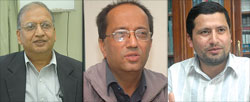|
|
| ALL IN THE MIND: (l-r) Director of Patan Mental Hospital Kapil Dev Upadhyaya, psychiatrist Bishwa B Sharma and psychologist RP Sapkota say mental health patients are often forgotten by health care professionals and government alike. |
Shanti Dulal, a 35-year-old woman suffering acute schizophrenia, was abandoned by her husband at the Mental Hospital in Lagankhel 45 days ago and doctors are still waiting for him to collect her. He promised to care for her during her hospital stay but disappeared after a few days, perhaps back to Gokarna where he is a teacher.
Shanti is not the only one. Mentally ill people are dumped on the streets, chained in their attics, or simply abandoned by relatives who can't deal with the stigma and burden of taking care of patients. In fact, fighting discrimination against mentally ill people is often a bigger challenge than actually treating the patients.
"After a while the person with mental illness becomes a burden, starts getting discriminated against by the family, and in the worst cases gets dumped either at the hospital or on the streets," says Sameer Banskota, a social worker at the hospital.
There are no reliable statistics on how many mentally ill people there are in Nepal, but worldwide the average is three percent of the population. This would put the number in Nepal at nearly one million. Bishwa B Sharma, a psychiatrist at Kathmandu's Medicare National Hospital, says mental health has been neglected for years and patients are vulnerable to arrest and torture. Women may be sexually exploited or rejected by familes.
"Health care facilities for mentally ill people have to be made better, more health professionals need to be trained and we need certified trained nurses to look after patients with mental illness," Sharma says. "But all that should go hand-in-hand with awareness programs, training and legal provisions for the mentally ill."
Just a few years ago there were just a handful of psychiatrists in Nepal.
Psychiatry is still not a popular subject among medical students with only four new psychiatrists graduating from Tribhuban University Teaching Hospital in Maharajganj and the BP Koirala Institute of Health Sciences in Dharan each year.
The Mental Hospital in Lagankhel has 40 beds, and other hospitals have a few more. But these are all in urban areas and patients from rural Nepal suffer most from the lack of services.
In 1997 a national mental health policy was drawn up, and more recently a Mental Health Bill was drafted. Experts say it is imperative that the draft be discussed and passed by the government soon as it has provisions relating to the care and support of mentally ill people, and land and property issues. But most importantly the act makes family, state and community responsible for mentally ill people.
In Nepal, mental health is not given as much priority as communicable or other diseases. "People don't die from mental problems, so the government does not see mental health as a priority," says RP Sapkota, a psychologist and counsellor at the Centre for Victims of Torture.
Experts say it is vital to have at least one psychiatrist in each zonal hospital, and there should be training for community health workers to raise awareness, identify mental illnesses, treat mild mental disorders and refer acute cases to psychiatrists. They suggest Nepal should look to the model of some Scandinavian countries, where social workers have legal powers to intervene and fight for the rights of the mentally ill.
Back at the Mental Hospital, someone has finally come to collect Shanti. It is not her husband but her 11-year-old daughter with an adult cousin. The cousin tells the doctors that the husband could not be reached. It appears he has abandoned Shanti. From now on it will be up to her daughter to look after her.
Treating mental war wounds
Depression, anxiety, headache, flashbacks and nightmares, insomnia, bedwetting and suicide: these are just some of the psychological effects that violence and war have on people.
Mental health experts say it is safe to assume that Nepal's decade-long civil war has left many people suffering from psychological trauma.
"We don't have official figures, because no one has done a formal study, but from the examples of conflict in other countries it is understood that approximately 10-40 percent of the affected population suffer from psychological trauma," says RP Sapkota, psychologist and counsellor at the Centre for Victims of Torture, Nepal.
Since early 2007, CVICT has been working on a formal study of the psychological affects of war on the general population. Experts argue that although many of the mental illnesses resulting from war are easily treatable, there may be long-term consequences if action is not taken promptly.
"The doctors have to be able to recognise the symptoms first and they need to be trained in psychological 'first aid', which means they should listen, mobilise support, and make sure their needs are met and the victims protected from further harm," says Kapil Dev Upadhyaya of the Patan Mental Hospital.
Sapkota says the best way to ensure those suffering from psychological trauma are well taken care of is for the government to work with other organizations who are working in the same field.
"It is imperative that we treat those who have undergone war trauma, and we have to start at the grassroots level," he says. "If we train community health workers to raise awareness on war and mental health, to identify, treat and refer serious cases to a psychiatrist, we would be a step closer to healing their pain."



